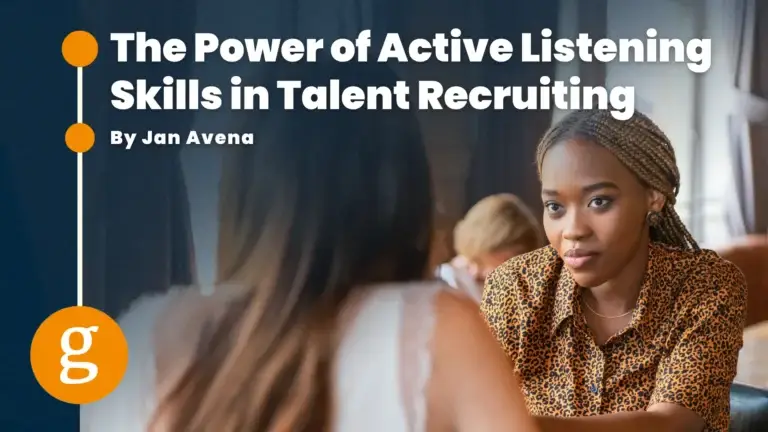A Personal Spotlight: International Stuttering Awareness Day
Rob Weaver | Hiring Advice, Opportunity for All | October 18, 2023

International Stuttering Awareness Day (ISAD) is observed every October 22. The day of recognition was established in 1998 to raise awareness of stuttering, a speech disorder also known as stammering and more formally as disfluent speech.
There are some misconceptions about people who stutter. Contrary to what some think, children and adults who stutter know exactly what they want to say but have difficulty saying it due to problems with normal fluency and flow of speech. How many people are affected by stuttering? Here are some facts from the National Institute on Deafness and other Communication Disorders (NIDCD):
- Stuttering affects 1% of the world’s population (approximately 70 million people).
- Roughly three million Americans stutter.
- While stuttering affects people of all ages, it occurs most often in children between 2 and 6 years of age as they are developing language skills.
- Approximately 5-10% of children stutter for some period in life, lasting from a few weeks to several years. Boys are two to three times as likely to stutter as girls.
- Approximately 75% of children recover from stuttering.
- For the remaining 25% of children who continue to stutter, it can persist as a lifelong communication disorder.
My own journey with a speech impediment
Although I did not stutter, I did suffer from a childhood speech impediment. There are parallels in what I experienced and how I coped that align with the experiences of kids and adults who stutter. So, in recognition of the October 22 day of observance, I want to share my story. I hope it opens more eyes to such challenges and imparts the knowledge that people can and do overcome them, learn to navigate life despite them, lead highly successful lives, and make great contributions to society and business.
I either never knew the official name of my impediment or there wasn’t a name for it, but I especially struggled with words beginning with certain letters. Y was one of them. I pronounced yellow as wellwoe. The letter Q was another. I pronounced barbeque as barbaclue. R and W were also difficult, especially if they were at the beginning of a word – which was very problematic for someone named Rob Weaver! If you say my name very fast five times, you’ll pronounce it the way I did, which was either Wob Weaver or Rob Reaver.
When people think you’ve momentarily forgotten your last name, they look at you funny, but for me, this was better than being viewed as having a speech impediment. I eventually learned that if I paused, somewhat noticeably, between saying Rob and Weaver, I could correctly pronounce my name. I was a college freshman before I stopped pausing and was so happy when I realized I no longer had to do it.
We moved around a lot during my childhood, which resulted in my being teased by kids in different states. Memories are somewhat framed by where we lived. I remember listening to phonetics records with my mom at home during first grade in Kentucky. I rode the bus with kids as old as fifth graders, and the teasing was brutal. Even the bus driver made fun of the way I spoke, which seemed strange even to a 7-year-old. I eventually refused to speak while on the bus.
We moved to a very small town in Michigan during the fall semester of my second-grade year, and fortunately, the school district had a speech pathologist who came to our school every week or two to provide speech therapy. I don’t know how many times I said, “Red Rubber Baby Bumpers” and “She Sells Seashells by the Sea Shore,” but if I had a nickel for every repetition, I could have retired at a very young age.
By the time we moved to Alabama (Roll Tide!) in the summer before I started fifth grade, I had overcome most of my speech impediment. It would occasionally creep in over the next five years or so, especially if I was excited and trying to speak fast. Even though I grew out of it, I think it affects me psychologically to this day. As a child, I wasn’t comfortable speaking around strangers because I didn’t know if they would make fun of me. Still, 50 years later, the thought of being at a party where I don’t know many people can be daunting – until I remember that almost everyone struggles with something.
Open minds lessen the impact
If there is a moral to this story, it is that stuttering, or any speech impediment, can have a lifetime impact on a person, but it does not limit their aspirations and abilities. President Joe Biden has said (and proven) that no one who struggles with stuttering should allow it to define them. His own childhood stuttering problem became a lifelong struggle, one he was reticent to talk about; however, in 2020, while on the presidential campaign trail, he publicly opened up about it at a CNN town hall. He is one of many highly influential people who live with a stutter and have compelling personal stories.
As for me, if anyone reading this ever time travels back to the early 1970s, please find me and tell my grade-school self that everything is going to be okay. Tell him that he’ll eventually spend his professional life in jobs where he speaks to people throughout the day. Neither Wob Weaver nor Rob Reaver will believe you, but he needs to hear it. Please also tell him to take better care of his baseball cards, especially the Nolan Ryan and Hank Aaron ones, and to not ride his bicycle while wearing bell-bottom jeans.
Is the next Jack Welch one of your job candidates?
The late Jack Welch, former CEO of General Electric and respected business titan, had a childhood plagued by stuttering. He was not able to rid himself of it until later in life, but he clearly did not allow it to interfere with his ambitions. Joe Biden was spot on the first time he publicly spoke about stuttering. “It has nothing to do with your intelligence quotient. It has nothing to do with your intellectual makeup,” Biden said. Both leaders and so many others set examples for others to follow.
The symptoms of stuttering vary and there can be triggers that make it more pronounced. For example, speaking before a group, talking on the phone – or being interviewed for a job – may make stuttering more severe. As a hiring manager or HR professional, you may encounter job seekers who don’t interview well, struggle to express themselves, and even stammer. It could be nerves. It could be a speech impediment. Do yourself a favor and give the individual a chance. You may discover your next leader!
Here are some tips when talking with a person who stammers:
- Don’t tell the person to slow down, take a breath, or relax. Just listen and be patient.
- Don’t interrupt or speak over them.
- Don’t try to guess their words or finish their sentences, which can be disempowering and unhelpful if you get it wrong.
- Maintain natural eye contact and wait until the person has finished speaking.
- Focus on what the person is saying, not on how they say it.
The best candidate for your job may be someone you least expect. Be open to every qualified candidate so you don’t miss out on the best talent. If you need assistance in finding exceptional people for key roles, contact me at your convenience. Goodwin Recruiting has been recognized as a Forbes ‘Best Executive Recruiting Firm’ and ‘Best Professional Recruiting Firm’ in America for four consecutive years. We help companies grow and succeed by building the strongest teams.
Finally, I invite you to join me in recognizing International Stuttering Awareness Day on October 22!
Share This Article
















































